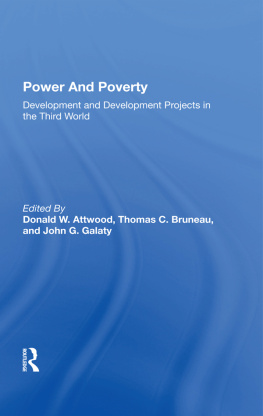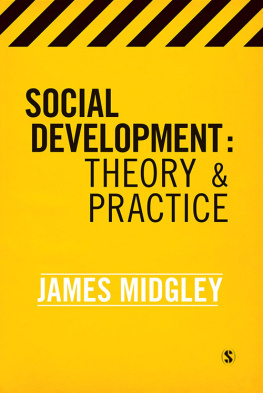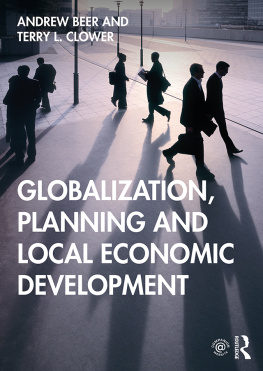Published 2002 by Westview Press
Published 2018 by Routledge
711 Third Avenue, New York, NY 10017, USA
2 Park Square, Milton Park, Abingdon, Oxon OX14 4RN
Routledge is an imprint of the Taylor & Francis Group, an informa business
Copyright 2002 Taylor & Francis
All rights reserved. No part of this book may be reprinted or reproduced or utilised in any form or by any electronic, mechanical, or other means, now known or hereafter invented, including photocopying and recording, or in any information storage or retrieval system, without permission in writing from the publishers.
Notice:
Product or corporate names may be trademarks or registered trademarks, and are used only for identification and explanation without intent to infringe.
A CIP catalog record for this book is available from the Library of Congress.
Text design by Jane Raese
ISBN 13: 978-0-8133-0984-2 (pbk)
ISBN 13: 978-0-8133-0983-5 (hbk)
T HIS BOOK IS ABOUT how anthropology is used in international development projects. Written from a practitioners viewpoint, it is designed for people who areor intend to beactive in planning and carrying out programs of directed change in culturally diverse environments.
Although anthropology has been involved with international development for decades, the discipline has yet to have a determinant influence on how development is done. Today, however, the field of development is in the midst of a major transformation that will present usas all transformations dowith new challenges and opportunities. If anthropology is ready to meet these challenges and opportunities, it can play a key role in development work in the future.
Today, nowhere on earth is truly remote. It often appears, thanks to television and the Internet, that the world is growing more Westernized with every passing day. But differences remain, many of them more important than ever. Advances in transport and communication have simply brought us into closer contact with the different worlds that were always there and that continue to shape and inform human interaction. We now have to deal with difference directly, instead of at a distance.
Nothing illustrates this better than international development itself, which is really an extended and intimate form of cross-cultural conversation. Our ability to manage this interaction in mutually productive and satisfying ways will be crucial to achieving the outcomes we all hope for.
Development is our biggest global project. If successful, it will not only transform the lives of billions of people, but change the way the world operates in fundamental ways.
But wishing is not enough. The philosopher Reinhold Niebuhr reminded us: The same strength which has extended our power beyond a continent has also brought us into a vast web of history in which other wills, running in oblique or contrasting directions to our own, inevitably hinder or contradict what we most fervently desire. We cannot simply have our way, not even when we believe our way to have the happiness of mankind as its promise.
As this book will make clear, the development industry is at present generally ill-equipped to manage the demands of sustained and focused cross-cultural collaboration, a necessary condition for development success. In a fundamental sense, international development work is an encounter between different worlds. To succeed, development needs to incorporate diversity of viewpoint and to forge common understandings and purposes that both acknowledge and use this diversity.
The subtitle of this book is encounters in the real world . In truth, however, the so-called real world is not a single entity, but consists of multiple worlds, each culturally-constructed. Anthropology, with its emphasis on, and respect for, these different cultural worlds, can make a major contribution to developing humankinds ability to understand and manage difference as we work to move the development agenda forward. This book is an attempt to show how this can be done.
Within the development literature, few books exist that describe how anthropology can be used in the design and management of change. One consequence of this is that few anthropology graduates are well equipped to enter this field and succeed within it. Indeed, our academic conferences and journals, to the extent that they discuss development at all, almost invariably emphasize accounts of projects that failed or agencies that ignored our contributions.
This text is a modest attempt at changing that situation. It provides a description of how development work today is done, focusing on projects as the nexus of the encounter between different cultural worlds and offering illustrations and examples of how anthropologists can contribute to making these encounters successful. By examining how projects work, anthropologists can better understand how to help them succeed. Each chapter contains one or more mini-case studies, many of them drawn from actual projects.
The book is divided into three parts. discusses applied anthropology, sketching its early development, noting shifts in emphasis, and outlining some of the issues that surround application today.
addresses project evaluation, and how agencies and organizations learnor fail to learnfrom project experience.
outlines some thoughts on how a new paradigm to guide development might be created.
The appendix provides some suggestions for preparing for a career in development anthropology. A glossary of terms and list of sources cited complete the book.
Riall W. Nolan
Cincinnati, Ohio
Endnotes
. Quoted in Kaplan (1997: 60).
M ANY PEOPLE HELPED with the ideas that formed this book. Dean Birkenkamp and Karl Yambert, in particular, extended support, offered suggestions and criticisms at key junctures, and managed, in their different ways, to keep this project on track, never losing patience with me. Michael Cernea, Michael Horowitz, and Thayer Scudder offered insights from their considerable professional experience, and suggestions on the manuscript as it developed.
Many other colleagues also offered suggestions and comments. Alexander Ervin, Allan Hoben, Jasper Ingersoll, John Mason, Donald Messerschmidt, Augusta Molnar, William Partridge, William Roberts, Linda Stone, Rob Winthrop, John Youngto these and many others, my sincere thanks for their support, advice, and encouragement.
Anthropology, international development, and cross-cultural learning have come to be my professional life. Three individuals in particular are responsible for the direction that my career took, and I would like to thank them most sincerely at this time for opening doors to meand, at times, pushing me through them. Arnold Sio at Colgate University suggested the Peace Corps to me, an experience that was to irrevocably change my life and my view of the world. Souleymane Faye of the village of Khenene in Senegal patiently showed me how to see with someone elses eyes and heart. Peter Lloyd at the University of Sussex helped me understand how anthropology could be used in development work, and encouraged me to stick with it. To each of these three quite different individuals, who inhabit cultural worlds very far away from one another, I owe much more than I can ever repay, much less express.








